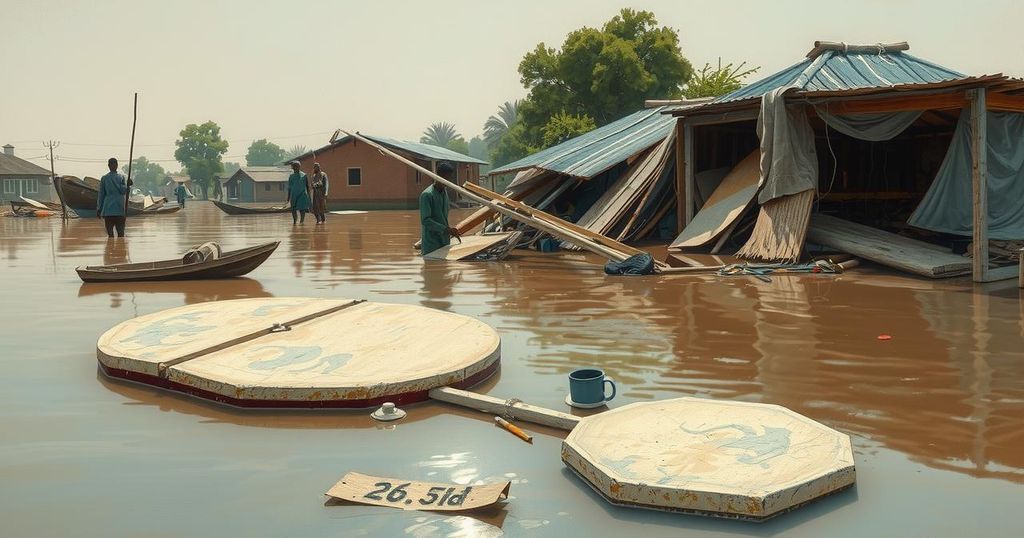Deadly Flood: Niger Communities Battle Stench from Decaying Corpses
Recent floods in Mokwa, Niger State, have led to a severe health crisis due to decomposing corpses. This disaster has killed hundreds and left thousands displaced. Both state and federal governments are responding with financial aid, but residents express urgent concerns over the lingering stench and recovery efforts.
Fast Summary
Recent floods in the Mokwa Local Government Area of Niger State have led to a severe health crisis, with residents plagued by the odor of decomposing corpses. The devastation resulted in significant loss of life and property, prompting both state and federal governments to pledge financial assistance. Local residents express urgent concerns regarding the lingering smell and the need for effective recovery measures.
Article Body
Nearly two weeks have passed since catastrophic floods swept through Mokwa, Niger State, yet residents continue to grapple with the nauseating stench arising from bodies trapped beneath debris. Many believe these are victims of the flood. This persistent odor becomes more pungent with the wind, a tragic reminder of the calamity, and it is causing mounting health concerns.
On May 28 and 29, Mokwa experienced a catastrophic flood that claimed the lives of approximately 200 individuals. The Niger State Emergency Management Agency (NSEMA) reported that over 50 homes were obliterated, displacing more than 3,000 people, with 503 households affected and at least 161 confirmed dead.
As the floodwaters receded, recovery efforts revealed corpses scattered throughout the area, some buried deep in the ground or concealed under sand. Residents, such as Esther Nwanosike, voiced their distress, highlighting the negative impact on local food businesses and urging the government to address the issue immediately. The airborne stench is driving customers away from her makeshift shop, raising alarms about potential health repercussions.
Alhassan Kolo echoed similar sentiments, noting how some of the recovered bodies are barely recognizable due to their decomposition. Kolo stated, “Honestly, some of the bodies we recovered, you can’t even recognise them anymore because they are decaying.” The struggle with sand accumulation in the aftermath further complicates their recovery efforts.
Ahmed Yusuf shared his agony regarding the overwhelming stench, likening it to a choking sensation. He implored the government for swift action to locate missing bodies. Other residents, like Salihu Ishaq, reflected on the unprecedented nature of this flood, recounting the loss of his sister and three children to the rushing waters. Ishaq expressed hope that government efforts would expedite recovery.
In response to the disaster, Vice President Kashim Shettima announced a N2 billion emergency fund to aid victims. The state government committed an additional N1 billion, along with essential food items. However, resident Amina Abubakar conveyed frustration over insufficient governmental support and ongoing searches for missing individuals, emphasizing the urgency of further action.
Idris Ibrahim, Director of Public Health, confirmed that efforts are underway to manage the lingering odor, assuring that a prevention control team is working tirelessly to mitigate the health risks. “We are doing something about it. A prevention control team is there and officials are working round the clock to ensure that the smell issue is addressed,” he stated.
Meanwhile, NSEMA spokesperson Hussein Ibrahim acknowledged the gravity of the situation. Although he was unavailable for further comment at the time, updates indicate that the death toll remains steady at 161. The National Emergency Management Agency is collaborating closely with both state and federal authorities in recovery efforts, aiming to restore normalcy for affected communities.
Niger State’s Governor, Mohammed Bago, claimed that foreign waters, possibly from the Niger Republic, may have contributed to the flooding. During a condolence visit from the Borno State Governor, Bago shared details of the disaster, noting that preparations are underway to relocate residents from coastal regions to safeguard against future flooding.
Conclusion
The communities in Mokwa are enduring a significant crisis marked by the dual tragedies of loss and health concerns. Despite pledges of financial assistance from both the federal and state governments, the path to recovery is fraught with challenges. Residents demand immediate action to address both the lingering odor and the broader implications of inadequate infrastructure in flood-prone areas. As recovery efforts continue, both government agencies and local populations face the pressing need for effective solutions to restore their lives and well-being.
In summary, the Mokwa community continues to face grave consequences from the recent floods, including health hazards stemming from decomposing bodies. While both state and federal governments have committed financial resources towards rehabilitation, immediate action is required to alleviate the ongoing health crises and to locate missing individuals. Local residents express an urgent need for government intervention to secure a safer and healthier living environment.
Original Source: punchng.com




Post Comment